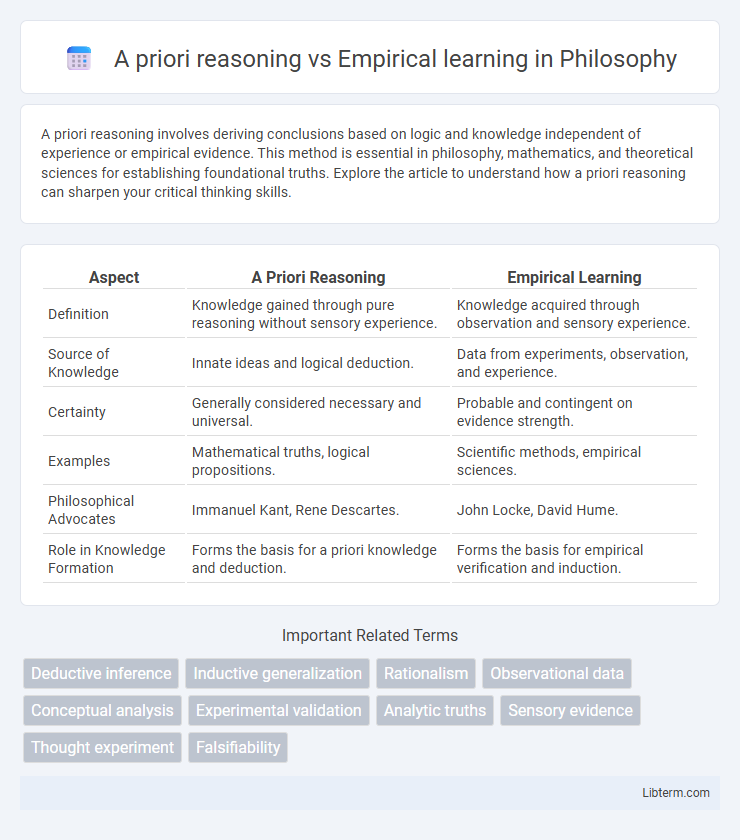A priori reasoning involves deriving conclusions based on logic and knowledge independent of experience or empirical evidence. This method is essential in philosophy, mathematics, and theoretical sciences for establishing foundational truths. Explore the article to understand how a priori reasoning can sharpen your critical thinking skills.
Table of Comparison
| Aspect | A Priori Reasoning | Empirical Learning |
|---|---|---|
| Definition | Knowledge gained through pure reasoning without sensory experience. | Knowledge acquired through observation and sensory experience. |
| Source of Knowledge | Innate ideas and logical deduction. | Data from experiments, observation, and experience. |
| Certainty | Generally considered necessary and universal. | Probable and contingent on evidence strength. |
| Examples | Mathematical truths, logical propositions. | Scientific methods, empirical sciences. |
| Philosophical Advocates | Immanuel Kant, Rene Descartes. | John Locke, David Hume. |
| Role in Knowledge Formation | Forms the basis for a priori knowledge and deduction. | Forms the basis for empirical verification and induction. |
Understanding A Priori Reasoning
A priori reasoning involves deriving knowledge independent of sensory experience, relying on logical deduction and innate concepts to establish truths. This form of reasoning is foundational in fields like mathematics and philosophy, where conclusions are reached through structured argumentation without empirical evidence. Understanding a priori reasoning highlights the distinction between knowledge obtained through pure thought processes versus knowledge gained through empirical learning and observation.
Defining Empirical Learning
Empirical learning refers to the process of acquiring knowledge through observation, experimentation, and experience, relying on sensory data to inform understanding. It contrasts with a priori reasoning, which depends on logic and deduction independent of sensory input. Empirical learning forms the foundation of scientific methods, emphasizing evidence-based conclusions derived from real-world interactions.
Key Differences: A Priori vs Empirical Approaches
A priori reasoning relies on knowledge independent of experience, using logic and deduction to arrive at conclusions, whereas empirical learning depends on observation and experimentation to form understanding. The key difference lies in a priori approaches being based on theoretical frameworks and innate principles, while empirical methods emphasize evidence collected through sensory experience. This distinction influences fields such as philosophy, science, and artificial intelligence, where theory-driven versus data-driven methodologies determine the validity and applicability of knowledge.
Historical Perspectives on Reasoning and Learning
A priori reasoning, rooted in ancient philosophy, emphasizes knowledge derived from logical deduction independent of sensory experience, as exemplified by Plato and Descartes' rationalist traditions. In contrast, empirical learning, championed by thinkers like Aristotle and later John Locke, prioritizes knowledge acquisition through sensory observation and experiential evidence. Historical perspectives reveal a longstanding debate between these epistemologies, shaping the evolution of scientific methods and cognitive theories.
Strengths of A Priori Reasoning
A priori reasoning excels in providing universally valid conclusions derived from logical deduction independent of sensory experience, ensuring certainty and consistency in knowledge acquisition. Its strength lies in enabling the formulation of hypotheses and theories based purely on rational analysis, which can be applied broadly across diverse contexts without reliance on empirical data. This form of reasoning is particularly valuable in mathematics, philosophy, and formal sciences, where foundational truths must be established prior to empirical validation.
Advantages of Empirical Learning
Empirical learning excels by leveraging real-world data to improve accuracy and adaptability, enabling models to identify complex patterns that a priori reasoning cannot anticipate. It allows continuous updating through new information, fostering robust decision-making in dynamic environments. Empirical methods also reduce biases inherent in predefined assumptions, enhancing validity in practical applications like machine learning and predictive analytics.
Limitations of Each Approach
A priori reasoning relies on deductive logic and inherent knowledge, but it struggles with real-world complexity and lacks adaptability to new, unforeseen data, limiting its practical application. Empirical learning depends on data and experience, which can introduce biases, require extensive data sets, and often fail to generalize beyond observed scenarios. Both approaches face challenges in handling uncertainty, where a priori reasoning may be too rigid and empirical learning too dependent on the quality and quantity of empirical evidence.
Examples in Science and Philosophy
A priori reasoning involves deriving conclusions through logic and theoretical deduction, as seen in mathematical proofs and philosophical arguments like Descartes' cogito. Empirical learning depends on observation and experimentation, exemplified by Newton's laws of motion derived from physical experiments and Darwin's theory of evolution based on biological data. The contrast highlights philosophy's reliance on innate knowledge frameworks, while science prioritizes evidence-based validation.
When to Use A Priori or Empirical Methods
Use a priori reasoning when dealing with theoretical frameworks, mathematical proofs, or situations requiring logical deduction from established principles without new data. Empirical learning is preferred in dynamic environments where data collection, experimentation, and observation drive decision-making and model improvement. Selecting between a priori and empirical methods depends on the availability of data, the need for hypothesis testing, and the domain's reliance on theoretical versus experiential knowledge.
Integrating Reasoning and Learning for Better Outcomes
Integrating a priori reasoning with empirical learning enhances decision-making by combining theoretical knowledge with data-driven insights. A priori reasoning leverages pre-existing logical frameworks and principles, while empirical learning adapts models based on observed data patterns. This hybrid approach enables more robust predictions and improved generalization across complex, real-world scenarios.
A priori reasoning Infographic

 libterm.com
libterm.com